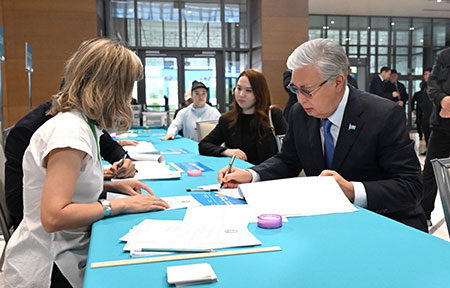
In a surprising turn of events, President Kassym-Jomart Tokayev’s reform agenda in Kazakhstan has garnered praise from an unlikely source: Yermurat Bapi, a member of parliament known as one of the most staunch critics of the previous administration. This acknowledgment from an opposition figure signals a potentially significant shift in the nation’s political landscape as Tokayev moves to dismantle the legacy of corruption and injustice and build what he terms a “Just Kazakhstan.” The core of this new vision is to fundamentally change the public mindset and improve quality of life by tackling systemic issues head-on.
A central pillar of Tokayev’s strategy is the implementation of a “Listening State,” a concept designed to foster transparent and robust communication channels between the government and its citizens. This principle aims to ensure that public opinion is not only heard but also integrated into major policy decisions. A prime example of this was the national referendum on the construction of a nuclear power plant. Given the country’s traumatic history with the Soviet-era Semipalatinsk nuclear test site, the decision to put the contentious issue to a public vote, rather than issue a presidential decree, was a powerful demonstration of this new, more inclusive approach to governance.
Tokayev is also reshaping the government’s composition, moving away from a system often perceived as prioritizing loyalty over merit. He has publicly stated that personal devotion to the president is irrelevant, emphasizing instead the need for officials who possess “professionalism and patriotism.” This philosophy has led to the appointment of younger, independently-minded individuals to key positions, who are expected to take responsibility and drive genuine change. The focus is on fostering a new generation of leaders who are self-reliant and invested in the nation’s success, rather than careerists seeking personal enrichment.
Underpinning these changes is a strong emphasis on “Law and Order,” a concept Tokayev has championed since taking office. This ideology seeks to cultivate a high level of legal culture where adherence to the law is paramount, from minor public infractions to serious crimes. The government has taken concrete steps to address pressing social issues, including passing tougher legislation against domestic violence and establishing psychological support centers for children. The penal system is also undergoing a transformation, with a new focus on rehabilitation and reintegration, encouraging businesses to establish production facilities within correctional institutions to provide inmates with skills and income.
Simultaneously, Kazakhstan is rapidly advancing its digital and technological capabilities, positioning itself as a regional hub. Recently, the country launched the most powerful supercomputer in Central Asia, a tool intended to drive the digitalization of key industries. Citizens already benefit from advanced e-government services, with many no longer needing to carry physical documents like driver’s licenses, which can be verified electronically. This digital transformation is so advanced that the government is planning to phase out physical service centers as nearly all state services become accessible online.
On the international stage, Kazakhstan’s strategic importance is growing. As a nation sharing the world’s longest land border with Russia and situated at the crossroads of major global interests—including those of China, the United States, and the European Union—its stability and trajectory are of global consequence. President Tokayev, an experienced diplomat, actively engages with world leaders, balancing a multi-vector foreign policy while keeping a firm focus on domestic reforms. This internal transformation, aimed at building a more just, modern, and technologically advanced society, makes Kazakhstan a critical nation to watch in the evolving geopolitics of Central Asia.
